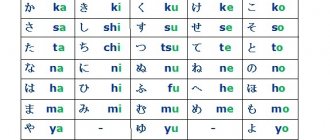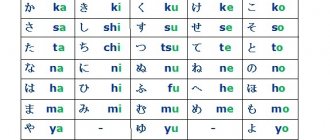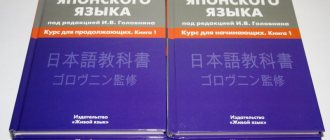A page from the Japanese book “Kankai Ibun” of 1807 listing the letters of the Russian alphabet
Russian language in Japan
is one of the most popular among foreigners[1]. It is studied in every tenth Japanese university, and the total number of students simultaneously studying Russian in these universities is about 2000 people[2]. The history of interlingual cultural relations began almost 300 years ago, but the Japanese expressed genuine interest in studying Russian only with the beginning of the country’s modernization.
History of Russian studies in Japan
Russian empire
The newspaper “Japan and Russia”, published in the city of Kobe for Russian prisoners of war, Lev Mechnikov, who taught Russian in Japan in 1874-1876 [3]
The first Russian-Japanese dictionary was compiled in the 18th century by a Japanese sailor named Gonza (Japanese: ゴンザ編gonza heng
), who after a shipwreck found refuge in Russia[4].
His work was republished in 1985 in Tokyo under the title “New Slavonic-Japanese Lexicon” (Japanese: 新スラヴ・日本語辞典shin suravu nihongo jiten
).
After the conclusion of the Russian-Japanese border treaty in 1855, and in 1858 - an agreement on maritime trade, a consulate of the Russian Empire was founded in the city of Hakodate. Under him, an Orthodox church was opened, the rector of which was Ivan Kasatkin, a graduate of the St. Petersburg Theological Academy. The year 1861, when he arrived in Japan, marks the beginning of the history of Orthodoxy in this country. During seven years of missionary activity, Saint Nicholas of Japan (this is how Kasatkin is now known) managed to perfectly master local literature, religion and language. This allowed St. Nicholas to open a Theological Seminary, where the Japanese became acquainted not only with the basics of Orthodoxy, but also with the Russian language and culture. The first graduates of the seminary - Matsui Juro, Mii Michiro, Senuma Kakusaburo - went to St. Petersburg for further studies. Entire generations of Japanese Russian scholars were educated at the St. Nicholas School, the most famous among whom are Konishi Masutaro (translator of Russian classical literature), Sato Yoshiharu (who knew Maxim Gorky closely) and Nobori Shomu (famous journalist, government official and employee of Waseda and Nihon universities) [5].
Also, a significant contribution to the teaching of the Russian language was made by the writer Futabatei Shimei, whose students compiled authoritative Russian-Japanese dictionaries[5].
The Russo-Japanese War generated significant interest in the Russian Empire. It was at this time that the teaching of the Russian language at universities began. True, the lack of official ties between countries did not have the best effect on the quality of curricula and textbooks[5].
Soviet Union
The October Revolution and the founding of the Soviet Union contributed to the development of bilateral relations in the fields of economics and culture. Teaching during this period is primarily practical. Works of Russian classics, primarily Alexander Pushkin, were used as teaching aids[6].
With the restoration of diplomatic relations between the two countries in 1956, a new milestone began in Japanese Russian studies. Some commercial organizations have begun to make a requirement to know Russian when applying for a job. Ballet troupes began to come to the country, screenings of Soviet films were organized, and concerts were organized by Mstislav Rostropovich[6]. After Yuri Gagarin's flight into space, the technical intelligentsia began to pay special attention to the culture of its northern neighbor[2].
A new direction of linguodidactics has developed in the USSR - Russian as a foreign language. Many Japanese young people, fascinated by socialism, studied at the Moscow Peoples' Friendship University. Upon returning to their homeland, many of them became prominent teachers of Russian[6].
Modern Russia
Inscription in Russian at the New Chitose Airport
After the collapse of the USSR, Russian-Japanese trade and economic relations began to decline, attitudes towards Russia acquired a predominantly negative connotation, and the status of the Russian language dropped significantly. As a result, many of those specialists who studied the Russian language cannot find application for their knowledge[2].
Nevertheless, the academic environment of the Land of the Rising Sun is quite highly conservative. Despite the lack of obvious business interest, a large number of language departments and a rather redundant teaching staff have been operating since Soviet times. For this reason, there are still quite a large number of institutions where the Russian language is taught: 116 universities (10% of all in the country), and in 24 of them its study is compulsory[2]. The most famous institution is the Tokyo Russian Language Institute, which over its 50 years of operation has managed to train more than 30 thousand Russian-speaking Japanese[1].
The quality of Russian learning remains at a fairly low level. Only two hours a week are allocated for studying at universities for two or three years. In some cases, the number of hours is reduced, but the number of students, on the contrary, increases. Sometimes the hours are left only in order to keep the teacher’s job[2].
The Russian language is included in the curriculum of a number of prestigious high schools, including the Kanto International School, where the language teaching period is three years[1].
Courses organized by Russian-speaking immigrants are quite popular. They are held under the auspices of such organizations as[1]:
- Center for International Friendly Exchanges (CIFE). Provides assistance in educational trips of Japanese students to Russia on the basis of contracts with Moscow State University, MGIMO and other universities;
- Japan-Russia Society (JAR);
- Society for Japan-Russia Relations (OSR).
A branch of the Far Eastern State University has been operating at the Hakodate International School on the island of Hokkaido since 1994. Students have two options for study programs - 2 or 4 years. Not only the Russian language is studied, but also broad cultural aspects. Teachers come from Russia and provide in-depth training. As of 2002, 80 people studied at the Far Eastern State University department. The branch runs accelerated courses for Japanese government employees[1].
According to experts, the education reform that has begun in Japan will not have the best effect on the level of Russian speaking. Foreign languages, according to the logic of the reformers, are considered completely optional. The decision whether to take a particular linguistics course will now be left to the students personally, so it is likely that the difficult-to-understand Slavic language will be abandoned in favor of studying English, Chinese and others[2]. It is expected that higher educational institutions in which Russian will be taught will be reduced to 24 universities where it is compulsory to study[7].
The reasons why students express a desire to learn Russian can be different[7]:
- more affordable passing grade compared to English-language courses;
- expectations that Russian-Japanese economic relations will reach a new level;
- aesthetic reasons: I like the melody of Russian speech, the style of Cyrillic letters, and so on;
- interest in Russian culture.
Despite the lack of a positive image of Russia among the Japanese, the Russian language remains one of the most popular among all languages in the country[1][7]. Radio Japan broadcasts are broadcast in Russian several times a day. TV lessons on central channels enjoy constant ratings. You can find educational materials in every bookstore. At the national level, two Russian language Olympiads are organized annually[7]. The St. Petersburg State University Olympiad in Russian as a foreign language for schoolchildren and students is in great demand in Japan.
There are no exact statistics on the number of Russian speakers in the country[1].
Translation agency or full-time translator
In a highly competitive market for professional translation services, choosing a translation agency provides advantages in price and speed.
In Russia and the European Union, more than 70% of companies do not hire full-time translators, but use the services of translation agencies. The average cost per translator in our translation agency is 20 thousand rubles per month. Maintaining a full-time professional translator will cost twice as much, plus taxes and work space. Using the services of a translation agency, savings on translations will amount to about 180 thousand rubles per year.
Borrowing
See also: Gairaigo
Words of Russian origin in Japanese are not as numerous as English or Portuguese borrowings. Some Russian words are used in modern Japanese with a completely different meaning.
| Katakana | Russian reading | What word is it derived from? | Meaning in Japanese |
| イクラ | ikura | caviar | Red caviar |
| ウォッカ | okka | vodka | vodka |
| カチューシャ | Katyu:sya | Katyusha | colored headband or ribbon |
| ノルマ | noruma | norm | quota, minimum requirement |
| セイウチ | seiuchi | sea lion | walrus |
| ピロシキ | pyrosiki | pies | pie |
| ペチカ | pathetic | stove | Russian stove |
| トーチカ | then:tika | dot | bunker |
Testing
Testing in Russian as a Foreign Language (TRFL) in Japan is carried out by specialists from St. Petersburg State University, authorized to conduct testing by Order of the Ministry of Education and Science of the Russian Federation dated October 28, 2014 No. 1394.
As an international exam to determine the level of language proficiency, TRFL allows you to confirm one of the 6 levels corresponding to the Common European Framework of Reference for Languages (CEFR), namely:
- A1 (TEU: elementary level),
- A2 (TBU: basic level),
- B1 (TRKI-I: first level),
- B2 (TRKI-II: second level),
- C1 (TRKI-III: third level),
- C2 (TRKI-IV: fourth level).
To prepare for testing in Japan, there is a special guide “Ladder of Success”, which includes the minimum vocabulary required to successfully pass the test, preparatory audio materials, tips and tricks. Additional materials for preparing for testing at all levels are posted on the St. Petersburg State University website. In addition, additional consultations are provided for test participants.
In addition to general state testing, in Japan there are special tests in Russian as a foreign language from St. Petersburg State University, which determine the level of Russian language proficiency in the field of business communication, as well as tests for bilingual children. Testing takes place every year at the end of August with the organizational and technical support of the Japanese Association of Cultural Relations with Foreign Countries (Tokyo). The testing procedure itself takes 3 days. After this, the work of the test takers is assessed and sent to the Language Testing Center of St. Petersburg State University for control. Test results become known to participants within 3 weeks from the date of the test.
In Tokyo, it has been held annually since 2002 for three days at the end of August[8]. There are six difficulty levels to choose from. To help language learners, a manual called “Ladder of Success” was compiled, which includes a minimum list of necessary words, audio materials and practical recommendations[9]. Initially, each student was given only one day to test their knowledge, which seriously complicated the task[9]. Since 2009, all those taking tests from level 2 to level 4 inclusive are allowed to spread the load over two days. The number of people taking the exam increased 6 times between 2002 and 2010 - from 11 to 66 people[9].
Since 2002, the number of people tested has increased 13 times. So, if 11 people took part in the first test session in Japan, then in 2015 more than 130 people passed it, and in 2021 the number of test takers is more than 500 per year.
Staff of translators in all languages
A team of proven professional translators of the agency is at your service.
The translation agency cooperates with proven translators from around the world. In terms of personnel, the company focuses on long-term joint activities with translators. This is the main factor ensuring the high and consistent quality of our translations. In all areas of translation, we can offer translation services on almost any translation topic. The costs of professional translators from Russia, the EU countries and the USA are the main expense item for a translation agency. It is not possible to simply reduce translation costs and translator fees. First-class specialists will leave and remain in the translation agency; at best, they will be “average”. However, it turns out that by hiring professional translators you can achieve good results at lower costs. Most specialists at the Flarus translation agency prefer to work regularly at lower prices than to have unstable orders at higher translation prices.
The service of booking a translator is popular among clients of the translation agency Flarus. For example, if you are satisfied with the quality of the translation and want the same translator to carry out all your orders, we can assign a specific translator to you.
Notes
- ↑ 1234567
Russian language in the world. Report of the Ministry of Foreign Affairs of Russia - M.: Olma Media Group, 2003. - 286 p. — ISBN 978-5-224-04547-1 - ↑ 123456
Arsentieva, 2006, p. 50. - Gorina E. N.
L. I. Mechnikov on the role of the geographical factor in the development of society // News of Saratov University. New episode. Series Sociology. Political science. - 2008. - T. 8. - No. 2. - Yamashita, 2010, p. 92.
- ↑ 123
Yamashita, 2010, p. 93. - ↑ 123
Yamashita, 2010, p. 94. - ↑ 1234
Arsentieva, 2006, p. 51. - Yamashita, 2010, p. 95.
- ↑ 123
Yamashita, 2010, p. 96.
Wide range of topics
The translation agency employs more than 650 professional translators and editors who translate technical, medical, legal, artistic and commercial texts. Technical translation is the main specialization of our bureau and is divided into narrow specializations: electrical engineering, mechanical engineering, metalworking, oilfield services, information technology, etc. If you are interested in a certain thematic area, then you can find out more about it in the subject classifier.
Literature
- Khruslov G.V.
Russian language in Japan: problems of distribution and specificity of perception: dissertation ... candidate of philological sciences: 10.02.01. - Moscow, 1987. - 304 p. - Gurevich T. M.
Russian language in Japan // Languages and cultures in the modern world: Program and collection of abstracts of reports of participants of the XI international conference. M.: NOPRIL. - 2014. - pp. 16-17 - Shatokhina G.S.
Russian language for children in Japan // World of Russian Word. - 2012. - No. 3.
Responsibility for translation quality
More than 18,000 clients work with the Flarus translation agency, among them there are domestic and foreign companies, patent attorneys, universities and research institutes, government agencies, foreign embassies, etc. One tenth of clients work with our agency under a contract for the provision of translation services.
You can choose translation services based on a framework contract or a one-time translation order. The Flarus translation agency has all the necessary official documents to provide high-quality translation services. Our clients Contact the Flarus translation agency, where you will be offered the services of qualified translators of English, German, French, Spanish, Chinese and other languages of the world. During the period of continuous work since 2001, our agency has taken a prominent place in the translation market.










